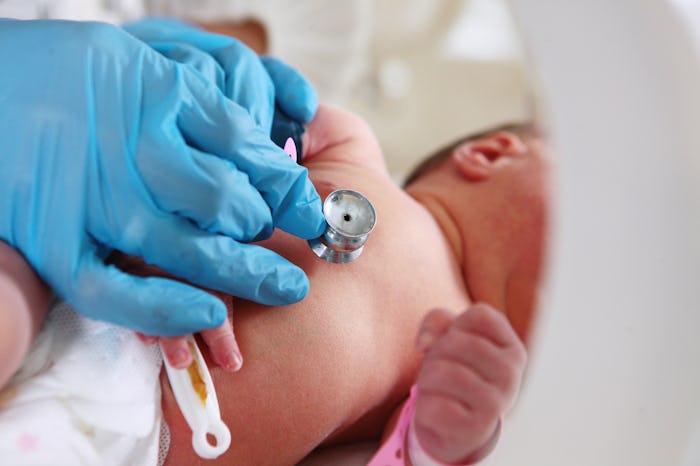Donating blood is a wonderful way to help your fellow humans in need. As you may already know, there’s no “one size fits all” when it comes to blood, and what kinds of blood donations an individual can receive depends on their blood type. As this is the case, you may also wonder how you can donate blood to newborns? Newborns are tiny and fragile, and they require specialized neonatal surgery given how vulnerable they are. Given the difference between a newborn’s body and an adult, is there a special way to donate blood?
“Any healthy adult may be able to donate blood," Dr. Meghan Delaney, the Medical Director of Transfusion Medicine at Children’s National Blood Donor Center, tells Romper.
"The Food and Drug Administration (FDA) makes the rules for who is allowed to donate and how the blood is tested in the U.S. When you go to your local blood center or hospital blood donor center, they will ask questions to see if you are eligible. Children’s National Blood Donor Center posts some of these questions so people can check to see if they are likely to qualify.”
That’s great news for anyone who is interested in donating, and who hopes their blood can be used for newborns. However, you may have heard that you need to be “CMV-negative” in order to donate to newborns. As the Red Cross website explained, CMV (Cytomegalovirus) is a flu-like illness that (most often harmlessly) infects most adults, but can be dangerous to a newborn. The antibodies retained by adults that exist in the blood could still be harmful to a newborn.
Fortunately, this doesn’t mean you have to be CMV-negative to donate. I asked Dr. Delaney about the CMV issue, and she explains that there are ways to remove the threat of CMV after donation: “The CMV virus is found in many adults and children. Although the virus doesn’t usually cause severe illness in healthy people, it can in fragile patients. It’s best if we don’t transmit CMV to any patient receiving blood, particularly babies. The blood donor center where you donate may test a blood donor to see if they are CMV positive or negative. They may or may not tell you the results. Some blood centers do not perform CMV testing because there are studies, including one of my own, that suggest that removing the white blood cells from the blood product offers the same degree of safety as using a blood from a donor who is CMV negative.”
So, how can you go about donating? “Blood donation is a straightforward process. It’s important that you are feeling well and have had a full meal and plenty of fluids beforehand. After you have passed the screening questions and your hemoglobin level is checked and found to be high enough, you are able to donate. Whole blood donations can take 30-45 minutes if you meet all of the requirements. Platelet donations can take up to two hours depending on your platelet count and if you meet all requirements. There are some answers to common questions posted on the Children’s National Blood Donor Center frequently asked questions webpage,” Dr. Delaney says, “Donating blood is a wonderful way to give back to the community and save a life!”
This is great news for everyone who would like to become a blood donor, and hopes their blood can be used to help newborns. As long as you are generally healthy, if you’d like to donate blood you will most likely be of great service to your local blood donation center. There’s a tool on the Red Cross website where you can find local blood drives. As the Cascade Regional Blood Services Baby Blood Programs website states, “Most people could potentially become a baby blood donor. There is no magic potion.” It’s quite awe-inspiring that we all have the potential to help babies in need.
